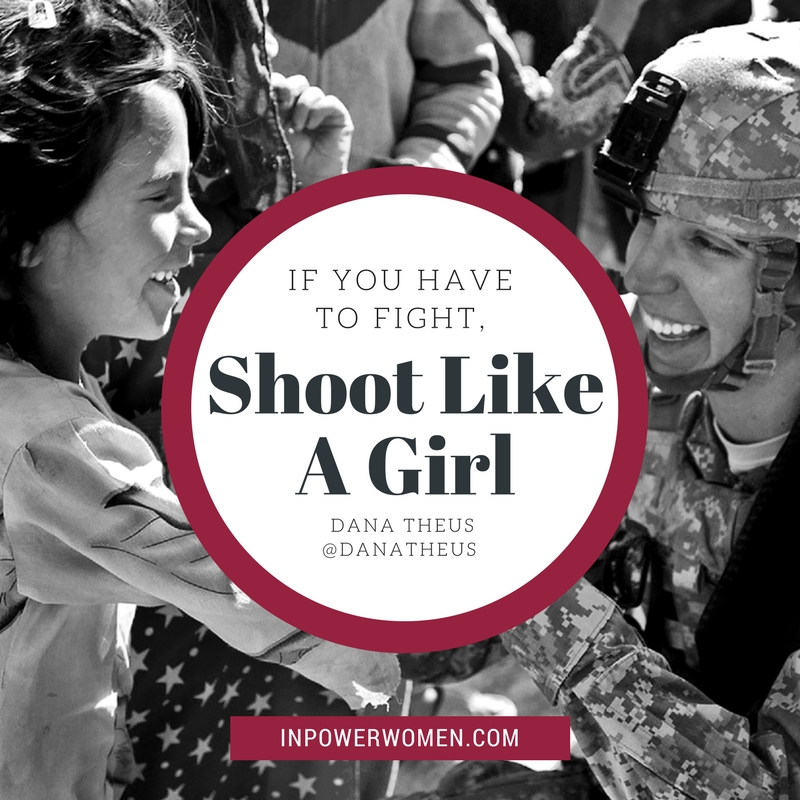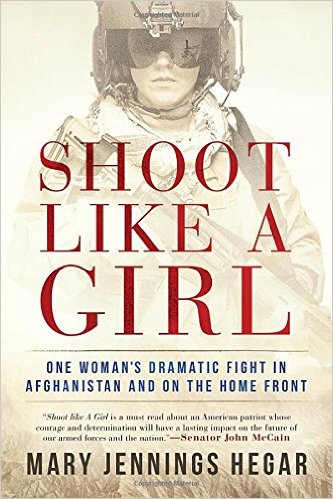Key Takeaways:
-
“Shoot like a girl” means lead with grit, heart, and skill. MJ Hegar’s story redefines what it means to be tough—not by acting like the guys, but by showing up fully as a woman who can fly, fight, and stand her ground under fire, both in combat and in the face of systemic discrimination.
-
The military’s barriers weren’t just physical—they were institutional. MJ’s career reveals how deeply ingrained misogyny can hide behind tradition and chain of command, making it harder for women to report abuse or rise without being sabotaged along the way.
-
Support can come from surprising places—but silence is betrayal. MJ’s journey shows us the importance of allies, both male and female, and the damage done when those around you choose to stay silent. In her world, loyalty wasn’t optional—it could mean life or death.
-
Women in combat don’t just serve—they sacrifice, and they deserve recognition. MJ’s legal battle to open all military roles to women was about fairness, yes, but also about survival, camaraderie, and the dignity of being fully seen for her contributions.
-
To succeed in hostile territory—whether in war or work—own your power and find your people. MJ’s resilience wasn’t just built on determination, it was grounded in fierce honesty, deep friendships, and the courage to walk away from what didn’t serve her—even if it wore a uniform.
Mary Jennings Hegar was an all-American girl from Texas. She had an abusive father, a loving mother and step father, and a dream to fly airplanes in war. She did that, and much more. Reading her memoir, Shoot Like A Girl, was a real treat for someone who explores women in leadership and has a son going into the Army. Her candid telling of a life still living highlights how her indomitable will and positive outlook helped her overcome setbacks that would challenge the strongest among us.
What I enjoyed most about her book was that it opened a door for me into the world of war, through an authentic woman’s lens, which isn’t to say it was soft and fluffy. In her writing, Major Hegar ret. (known as MJ) shoots like a girl, and she shoots straight. MJ was one of those heroic women “on the front lines” before women were officially allowed to be there. She flew medivac helicopters in Afghanistan during three tours of duty, and served in the California National Guard fighting wildfires and running rescue missions in between. She saw death and was wounded herself in a harrowing string of events when her helicopter was shot down with wounded aboard. Her sharpshooting helped everyone escape alive.
Her journey to become a combat pilot was equally as harrowing.
Systematized Discrimination
Many of us have had to endure sexual discrimination and abuse, from the mundane to the terrorizing. We’ve known many good-hearted men who still hold us back, thinking they’re protecting us. We’ve worked for women who felt we were their competition and refused to help us at best and opposed us outright at worst. But in the private sector, we have recourse, even if we choose not to use it. We can get another job or file a complaint.
MJ didn’t have those same luxuries in her careers in the U.S. Air Force and National Guard, where she feared (with good reason) that filing a complaint would end her career. What her tale reveals to me on the surface is what misogyny and discrimination look like when the system itself supports it. Her commanders are both heroes and villains, helping her and holding her back along the way. A military doctor, who she had no choice but to see because he threatened to disqualify her from flight training, sexually abused her and was later given commendations, perhaps for “fessing up” about the abuse. Her comrades in arms both ostracized her and embraced her, depending on their own prejudices.
I’m sure that there are men in our military who’ve experienced all of this, especially those who fall outside some norm or another. I’ve read of similar abuse experienced by homosexual servicemen, and I’ve read that some have been treated no differently than their straight comrades. As with all organizations, each individual’s experience is made up of the people we deal with and not everyone’s experience will be the same. That said, I think it’s important for us to peer into these closed systems when we can, and learn through the eyes of those brave enough to share with us their experience.
Even though I was born into the Mad Men era, I never personally witnessed the workplace when it was okay to treat women as second class citizens. Apparently, the military is a bit behind the private sector in this regard, though I know for a fact that there is plenty of discrimination in the private sector too (and there are things we should be doing about it.) So, I believe it’s useful for women and men to read MJ’s tale to understand what such discrimination looks like and what it takes to overcome it.
Overcoming Sexual Discrimination
MJ’s primary weapon in her fight to fly was her will. Starting in high school when she was applying for ROTC scholarships, her retired Navy mentor tried to undermine her by writing a scathing “recommendation.” Though he’d been her personal supporter all along, he was disgusted by her dreams to be a combat pilot, and instead of refusing to write her rec, he wrote a terrible one. Her recruiter told her, “get used to it,” and she did. Despite a busted knee, earned trying to prove she could handle the obstacle course as well as any guy in college, she persevered through trials both physical and emotional.
Here are the lessons I learned reading her book about what it takes to succeed when your gender works against you:
- Your standards must be very high, and you must be the best
- Don’t stop. Know there are ways around road-blocks and find them
- Be truthful with men who support you – they can help you
- Cry when you have to
- Hold tightly to the people who really support you and make deep friendships
- Love your job
- Don’t stay with a husband who hurts you, find a husband who loves you for who you are
- Don’t use sex as a weapon – it will backfire on you
- Don’t be stupid – learn from your mistakes
- In times of loneliness your dog can be your best friend and that’s okay
Here’s something else I learned that hadn’t been as clear to me. When your “brothers” don’t have your back, you don’t have to have theirs. One of the most challenging things for me to read in her story was how the guys in one of her units failed to stand up for her when a bigot almost got her in trouble. If it hadn’t been for a guy in another unit who helped her out (giving her a “missing ammo” clip her comrade stole from her locker), she’d have taken the fall. Of course, the guys in her unit who knew what was going on were trying to stay out of a “he said, she said” argument, but the overall effect was to undermine the strength of the team. MJ lost trust in them, and in battle that trust is critical. So when she had the opportunity to join another unit who valued her, she took it.
There’s a lesson in this for men who choose to be bystanders. You may be buying the trust of “the other guys” but you’re losing the trust of the women. And when they can shoot and fly as well as you, that’s not a good thing.
Taking the Fight to Higher Ground
I really enjoyed MJ’s story, and appreciated the vision of heroism she gave me as I read Shoot Like A Girl, but it was at the end she earned my undying gratitude. When she finally stepped out of the cockpit due to a physical disqualification (her knee injury finally caught up with her), she was unable to qualify for other combat jobs due to the restrictions about females in combat. Shortly after this, in 2012, the ACLU gave her the opportunity to stand up for women’s rights to be on the front lines officially. Believing the rules that brought women into combat only in special circumstances were broken, MJ “broke ranks” with the brotherhood in one sense and joined an ACLU suit against the Defense Department and co-founded the Combat Integration Initiative to fight for women’s right to serve.
In her book, MJ points out that the women on the front lines are forced to serve in a segregated way in combat and were unfairly disadvantaged, prevented from training with their units to become full-fledged team members. Perhaps worse, women in combat were not recognized for their heroism and sacrifice in the way their brothers in arms were. Her friends and other men in the service supported her and the other women represented in the suit, and in 2015 the Defense Department moved to open all positions to women, a policy that is still being put into effect and some worry will suffer under the Trump administration despite statements by Secretary Mattis that indicate he has no plans to change the policy.
When MJ was in tactical training earning a sharpshooting designation, her instructor smiled when she nailed it and congratulated her for “shooting like a girl.” At first she was offended, believing he was belittling her shooting because of her lady parts. No way, he corrected her, girls shoot better than guys, and went on to explain the physiological advantages women have, able to keep cooler heads with less testosterone flooding their systems. She later used this skill to shoot back at some enemy combatants trying to kill her crew, despite her own injuries, and bought them valuable time to board the wounded onto a rescue helicopter. For this she was awarded the Purple Heart as well as the Distinguished Flying Cross with Valor Device. So let me add one more learning I gleaned from MJ’s story.
- Discover your natural advantages, and use them under pressure
Read MJ’s story for yourself: Shoot Like A Girl, and follow her on Twitter and Facebook.
Guide to Women in Leadership
Organizations with women in their executive suites regularly out-perform others. Yet rising female executives (and their mentors) are frustrated at how hard it is to break through the glass ceiling. In this extensive guide, Executive Coach Dana Theus shares her tried and true strategies to help women excel into higher levels of leadership and achieve their executive potential.








